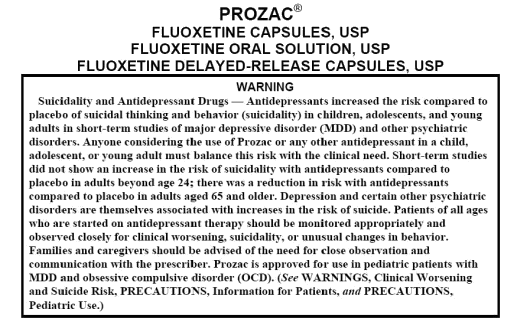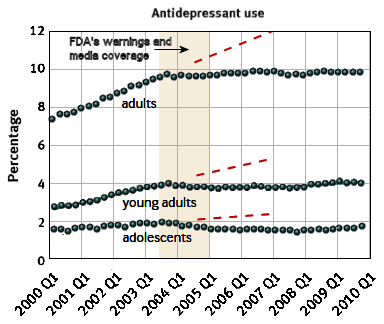by Richard A. Friedman, M.D.New England Journal of Medicine 2014 371:1666-1668.
-
Case Reports: There are ample collections of case reports [SSRI Stories, Rxisk, etc] that document the syndrome of Akathisia with suicidal and homicidal thoughts and acts. And the most convincing evidence comes from personal encounter. Having seen such cases, I have no question that it is a very real phenomenon, though uncommon.
-
Data from RTCs [Randomized Clinical Trials]: Meta-analyses, notably the FDA review by Hamads et al, find a small but significant increase in suicidality in the Clinical Trials of antidepressants in youth.
-
Population Studies: The majority of authors who oppose or want to revoke the Black Box Warning base their arguments on the collection of population studies that come from a variety of sources. They show that the Black Box Warning did decrease anti-depressant prescription rates particularly in youth. Most of these studies show no real change in the overall rates of suicidal thinking or completed suicide.
Cochrane Systematic Reviewsby Sarah E Hetrick, Joanne E McKenzie, Georgina R Cox, Magenta B Simmons, and Sally N Merry14 NOV 2012… Based on 14 of the trials [2490 participants in total], there was evidence that those treated with an antidepressant had lower depression severity scores than those on placebo, however, the size of this difference was small. Based on 17 trials [3229 participants in total], there was evidence of an increased risk [64%] of suicide-related outcomes for those on antidepressants compared with those given placebo…

Nevertheless, given the overall direction of these trends, it is critically important for primary care providers, who see and treat a substantial proportion of depressed patients, to know that the risk posed by untreated depression — in terms of morbidity and mortality — has always been far greater than the very small risk associated with antidepressant treatment. We need to better educate physicians, to help them understand that although they cannot ignore that small risk, they can safely manage it by carefully monitoring their patients, particularly children and adolescents, during pharmacotherapy.
What should the FDA do in light of these observational data? Given that the agency’s 2007 modification of the black-box warning has not been sufficient to prevent what seems to be a chilling effect on depression treatment — perhaps the mere presence of a warning speaks louder than any clarification it may contain — I believe it’s unlikely that further modification would be helpful. I would therefore argue that the FDA should consider removing the warning entirely…
Well, I wasn’t «chilled» by what I recalled of that paper Friedman is talking about, by Lu et al, so I went back for another look. I still wasn’t impressed that the Black Box Warning had that big an effect. I noticed that their graphs were drawn on different scales for adolescents, young adults, and adults. So on a lark, I graphically transposed the antidepressant usage onto a single graph with a unified scale, and look what happened…

compared to this [a bit of presentation bias trickery at work in my humble opinion].

The dip in prescriptions for adolescents was not so impressive after all! And as I look at those changes, they’re exactly what I would predict [and want] from the Warning. In all three cases [adolescent, young adult, and adult] it’s not so much that prescription rates even fell, they stopped rising [recall that it’s a percentage scale]. That’s expected, rational, careful – good for them. So back to the thread, I’m really not «chilled» now.
This is my biggest pet peeve with the KOL set. They talk as if a diagnosis of depression means the patient should be on antidepressants. Where did that ever come from? That’s not even true for adults – and it’s absolutely not true for adolescents. These drugs are just not that powerful. And, by the way, they’re still prescribing a whole lot of antidepressants for kids. So Dr. Friedman’s [and other anti-Black-Box-Ninjas’] argument that we need to get rid of the Warning so that Primary Care Doctors won’t be afraid to give these deprived teens antidepressants is unsupportable and totally irrational from any direction I know. Shame on him for even making the suggestion.
by Marc B. Stone, M.D.New England Journal of Medicine 2014 371:1668-1671.
It took me a while, but eventually I learned that what I thought was depression was an iron deficiency, grief and exhaustion from PTSD, and if I had been stupid enough to see a psychiatrist for fatigue— MS. I have never had an endogenous depression, and I find it absolutely appalling that trained physicians aren’t looking for physical and mental/emotional causes of what can be too easily diagnosed as depression before handing out that label and scrips.
I spent months on useless and damaging drugs while my body/brain was starved for oxygen. I spent too much time on drugs that have been demonstrated to be useless for PTSD. I finally learned and spared myself the drugs for what finally revealed itself to be the fatigue and brain fog of MS.
And, I had a hypomanic episode on an antidepressant, so ended up with a diagnosis of bipolar II. There are pockets of good research here and there, especially on PTSD, but the overall format is to diagnose quickly and drug with cocktails for life. It’s just wrong.
I have no doubt that some children and teens suffer from a bona fide mental disorder, but I suspect it’s rare and that most of it is either a developmental problem or a natural reaction to truly depressing life events and there is little in place to deal with such individual and socially created problems.
Dr. Mickey, good to see you saying: “This is my biggest pet peeve with the KOL set. They talk as if a diagnosis of depression means the patient should be on antidepressants. Where did that ever come from? That’s not even true for adults – and it’s absolutely not true for adolescents.”
Somebody has to say it. “Treatment” should not be a synonym for “drugs.”
these clowns who call themselves neurologists and psychiatrists have totally underestimated the power of perspective.
psychotherapy, imo, is a very real avenue for treatment of depression. unfortunately with the crony system established by GLG, there aren’t many real psychiatrists, just people who cash in on writing bad drug scripts for people they’re supposed to care for.
it’s astounding how these people call themselves doctors. so much for ‘do no harm’.
A possible cause of the depression in youth.
http://www.sleepreviewmag.com/2014/04/teens-sleep-deprived-stressed/
Of course, it is easier to throw antidepressants at the problem instead of referring them to a sleep specialist for further evaluation.
The trend in medicine for some time is that a diagnosis equals treatment. This is part of the push on the hep C drugs since many will test positive, but few will develop symptoms, and few yet will suffer death.
Other conditions have also followed this route. In the beginning a high PSA number resulted in surgery, the old cut it out cancer treatment. Today a high PSA number is only an indicator of the need for additional testing and possible treatment. This has not stopped hospitals from running “free” PSA test at the local mall, with no knowledge of the lives saved, but are aware of revenue generated.
The KOL set will use their MD to speak to the GP’s about the need for patient care, and the need not to be sued, thus driving the use of these drugs. Few, if any, doctors spend the right amount of time with patients. Office administrators, practice managers, and owners all set unattainable time lines for patient visits. Throwing paper at the problem in the form of prescriptions solves the immediate problem, generates income, and in the case of hospital owned practices, generates income on the back end through arrangements with the drug companies.
In the book What Your Doctor Won’t (Or Can’t) Tell You by Evan S. Levine, MD the author highlights his father going into the hospital and coming out with a whole new set of prescription. He eventually found out the hospital formulary was set by the back door deals with drug companies. Prescriptions that were much more expensive.
One recent article highlighted how a doctor was threatened with being barred from the hospital, and a legal action being started, to prevent them from any input into their parents care.
KOL’s leverage their position and reputation for the benefit of their drug company employers to help support such actions. These “smart guys,” or as one doctor put it “snow jobs,” are more than willing to sell for the drug companies, while administrators with little or no medical, or even business knowledge, accept this as fact.
Steve Lucas
I cannot understand the push to get primary care doctors to prescribed psychiatric drugs for children.
As I read the black box warning, it emphasizes the need for increased monitoring of young patients due to suicidality. PCPs are notoriously poor at any kind of monitoring after prescribing psychiatric drugs to anyone. If, recognizing their inability to provide appropriate monitoring for psychiatric drugs, some opt out of prescribing them to youngsters, is this not a public good?
Secondarily, that PCPs are deemed to have appropriate diagnostic, prescription, and monitoring skills for psychiatric drug treatment of an extremely vulnerable group of people suggests that psychiatry is an unnecessary, redundant specialty.
Psychiatrists should be up in arms that Friedman and others suggest their services are not needed when treating youngsters. If psychiatry can’t add value there, where does it add value?
If this tack isn’t anti-psychiatry, I don’t know what is. I guess psychiatrists don’t mind so much when they’re being denigrated by their own.
Two factors to PCPs prescribing for kids:
1. Less C&A psych docs around, and those out there think they are worth $200 or more an hour. Think that is outrageous? Had a Locum recruiter tell me of a C&A doc who wants $250 an hour to do locum work. Maybe that is just one doc, but, think it is just one in the country?
2. Everyone, and I mean EVERY ONE , thinks that psych meds are no different than somatic meds these days. Oh yeah, until the complications arise, and then guess what happens, the patient and parents have to scramble to find a psych doc when the PCP suddenly says “I can’t handle this, you need to see a psychiatrist”.
To any and all the somatic docs reading here, tell us how you would be so supportive if psychiatrists prescribed antibiotics or diabetic meds to first time presenters in the office.
Let the hypocrisy flow…
Thank you, Joel. Please consider how someone with adverse reactions might feel about psychiatric care after being referred by a PCP and finding the psychiatrist doesn’t know what to do!
http://tinyurl.com/m4fxo7z
Nearly Half of Toddlers Diagnosed with Psychiatric Disorders Have Serious Sleep Problems
Small sample size but since sleep disorders are typically under reported, I suspect this is the tip of the iceberg. More information that supports my point that perhaps depressed youth don’t need more Prozac but need to be screened for sleep disorders.
Thanks for the link, AA. I have been seeing multiple articles about sleep issues in adolescents but nothing regarding children before this.